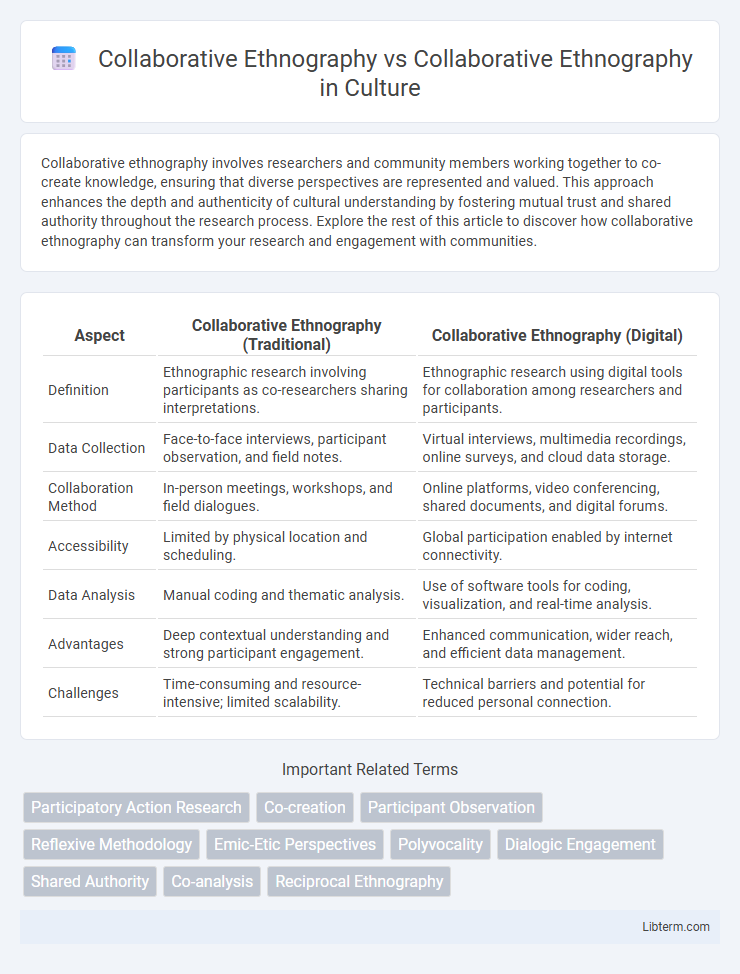Collaborative ethnography involves researchers and community members working together to co-create knowledge, ensuring that diverse perspectives are represented and valued. This approach enhances the depth and authenticity of cultural understanding by fostering mutual trust and shared authority throughout the research process. Explore the rest of this article to discover how collaborative ethnography can transform your research and engagement with communities.
Table of Comparison
| Aspect | Collaborative Ethnography (Traditional) | Collaborative Ethnography (Digital) |
|---|---|---|
| Definition | Ethnographic research involving participants as co-researchers sharing interpretations. | Ethnographic research using digital tools for collaboration among researchers and participants. |
| Data Collection | Face-to-face interviews, participant observation, and field notes. | Virtual interviews, multimedia recordings, online surveys, and cloud data storage. |
| Collaboration Method | In-person meetings, workshops, and field dialogues. | Online platforms, video conferencing, shared documents, and digital forums. |
| Accessibility | Limited by physical location and scheduling. | Global participation enabled by internet connectivity. |
| Data Analysis | Manual coding and thematic analysis. | Use of software tools for coding, visualization, and real-time analysis. |
| Advantages | Deep contextual understanding and strong participant engagement. | Enhanced communication, wider reach, and efficient data management. |
| Challenges | Time-consuming and resource-intensive; limited scalability. | Technical barriers and potential for reduced personal connection. |
Understanding Collaborative Ethnography: Definition and Scope
Collaborative ethnography is a research approach emphasizing co-creation of knowledge between ethnographers and participants, prioritizing mutual trust, shared authority, and reflexivity. This method challenges traditional ethnographic paradigms by involving community members as active collaborators in data collection, analysis, and interpretation, expanding the scope beyond individual researcher perspectives. Understanding collaborative ethnography requires recognizing its focus on ethical engagement, empowerment, and the integration of diverse voices to produce richer, more inclusive cultural insights.
Historical Evolution of Collaborative Ethnography
Collaborative ethnography evolved significantly since its emergence in the late 20th century as a response to traditional ethnographic practices, emphasizing shared authority between researchers and participants. Early models prioritized reflexivity and participant empowerment, adapting methodologies to address power imbalances inherent in conventional ethnography. The historical evolution highlights a shift from extractive research practices toward inclusive, co-constructive approaches that foreground community engagement and ethical accountability in knowledge production.
Key Principles of Collaborative Ethnographic Practice
Collaborative ethnographic practice centers on shared authority, emphasizing reciprocal relationships between researchers and participants to co-construct knowledge. It prioritizes transparency, ongoing dialogue, and mutual respect to ensure that all voices shape the research process and outcomes. Key principles include ethical engagement, reflexivity, and joint responsibility for representation and dissemination of ethnographic findings.
Methodological Approaches in Collaborative Ethnography
Collaborative ethnography emphasizes participatory research methods where community members actively contribute to data collection and analysis, fostering co-creation of knowledge. This approach contrasts with traditional ethnography by prioritizing shared authority, reflexivity, and ethical engagement throughout the research process. Techniques such as collective storytelling, joint interpretation sessions, and iterative feedback loops enhance validity and empower participants, making methodological approaches in collaborative ethnography inherently dynamic and inclusive.
Researcher-Participant Dynamics in Collaborative Ethnography
Collaborative ethnography emphasizes a participatory approach where researchers and participants co-construct knowledge, fostering mutual respect and shared authority throughout the research process. This dynamic challenges traditional hierarchical roles by valuing participants' insider perspectives and experiential expertise, leading to richer, more nuanced cultural interpretations. Effective communication and reflexivity are key to maintaining ethical relationships and ensuring that the research outcomes benefit both scholars and community members.
Ethical Considerations in Collaborative Ethnography
Ethical considerations in collaborative ethnography prioritize mutual respect, informed consent, and shared authority among researchers and participants, ensuring transparency and accountability throughout the research process. Emphasis on power dynamics and cultural sensitivity enhances trust and supports equitable collaboration, mitigating exploitation risks. Ethical frameworks in collaborative ethnography demand ongoing reflexivity and negotiation to honor participant autonomy and protect their rights.
Benefits of Adopting Collaborative Ethnography
Collaborative ethnography enhances the research process by fostering inclusive participation and co-creation of knowledge between researchers and community members, leading to richer, more nuanced data. It promotes ethical research practices through shared authority and mutual respect, improving trust and the accuracy of cultural representation. Adopting collaborative ethnography facilitates empowerment of marginalized voices and supports social justice by ensuring that research outcomes directly benefit the involved communities.
Challenges and Limitations in Collaborative Ethnographic Research
Collaborative ethnographic research faces challenges including negotiating power dynamics between researchers and participants, which can affect data authenticity and interpretation. Limitations arise from differing objectives and expectations among collaborators, complicating consensus-building and methodological consistency. Time constraints and resource allocation also hinder the depth and scope of participant engagement, impacting the overall validity of findings.
Case Studies Highlighting Collaborative Ethnography
Case studies highlighting collaborative ethnography demonstrate its effectiveness in engaging multiple stakeholders in the research process, fostering mutual learning and co-creation of knowledge. These cases often reveal enhanced data richness and deeper cultural insights compared to traditional ethnographic methods, emphasizing participatory methodologies. Collaborative ethnography's emphasis on shared authority and reflexivity improves ethical considerations and community empowerment within diverse fieldwork contexts.
Future Directions for Collaborative Ethnography
Future directions for collaborative ethnography emphasize integrating digital tools to enhance participant engagement and data collection accuracy. Advancements in AI-driven analysis open new pathways for interpreting complex social interactions within collaborative frameworks. Emphasizing ethical co-creation, future research prioritizes equitable representation and shared authority between researchers and communities.
Collaborative Ethnography Infographic

 libterm.com
libterm.com